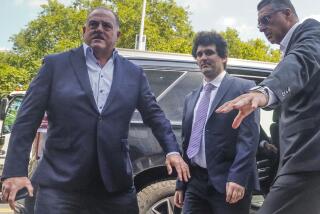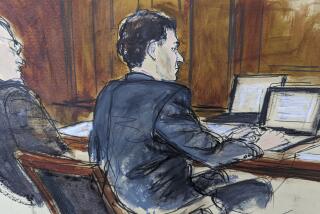Case of Arkansas Bankers Goes to Jury
- Share via
LITTLE ROCK, Ark. — The criminal case against two Arkansas banker friends of President Clinton went to a jury Thursday after W. Hickman Ewing Jr., an associate Whitewater prosecutor, charged that the pair had misused their institution’s funds for political purposes.
Summing up his case in the 6-week-old trial, Ewing told jurors that Perry County Bank co-owners Herby Branscum Jr. and Robert M. Hill curried favor with then-Gov. Clinton in 1990 by misapplying $13,200 in bank funds as campaign contributions.
But defense attorney Dan Guthrie said in his closing argument that “these men did nothing wrong” and cited videotaped testimony on their behalf by Clinton and live testimony by White House Deputy Counsel Bruce Lindsey, who was Clinton’s campaign treasurer when he was reelected governor in 1990.
Ewing and Guthrie also took opposing viewpoints on Neal T. Ainley, the bank’s former president. Ainley said that at the direction of Branscum and Hill, he did not file federal reports on $52,500 in cash withdrawals by the Clinton campaign from its account at the bank.
Federal law requires banks to submit reports to the Internal Revenue Service, known as currency transaction reports, whenever a customer deposits or withdraws $10,000 or more in cash. The law is aimed at curbing money laundering and misuse of banks by drug traffickers. In addition to misapplication, Branscum and Hill are charged with violating the law on the transaction reports, based largely on Ainley’s testimony for the prosecution that he acted at their behest.
U.S. District Judge Susan Webber Wright dismissed jurors late Thursday and ordered them to resume deliberations this morning. They are not sequestered.
“Neal Ainley knew very well what his job was,” Ewing said in his closing argument. “He followed orders from his bosses.”
Guthrie, however, ridiculed that statement.
*
“They want you to believe Herby Branscum engaged in a criminal conspiracy with a man [Ainley] he had known less than one year and who was formerly a government bank examiner,” the defense attorney said, his voice rising. “That fact alone should cause you hesitation about Neal Ainley’s story and create a reasonable doubt in your minds.”
In a plea agreement last year with the office of Whitewater independent counsel Kenneth W. Starr, Ainley won a reduced sentence of two years’ probation, a $1,000 fine and 416 hours of community service after pleading guilty to two misdemeanors.
Jack Lassiter, the attorney for Hill, joined Guthrie in condemning Ainley. “He was influenced by the deal he made, and he had the habit of trying to blame other people,” Lassiter told jurors.
Ewing attacked the credibility of Lindsey, Clinton’s most trusted aide for nearly two decades. Lindsey, who testified as a defense witness last week, was classified as an unindicted co-conspirator by the prosecution.
Heaping scorn on the testimony from Lindsey, who denied allegations that he had influenced the bank to not file the required currency reports, Ewing reminded jurors that Lindsey frequently cited a lack of recollection to many questions about the financing of Clinton’s last gubernatorial campaign.
Ewing, however, was gentle in his references to Clinton’s testimony on behalf of the defendants.
Noting Clinton had testified that large contributions by Branscum and Hill had no bearing on their subsequent appointments to state commissions, Ewing declared:
“President Clinton said it didn’t make any difference. But in the eye of the beholders--Branscum and Hill--it did. One of the ways you ingratiate yourself is to give contributions.”
Ewing charged that Branscum and Hill listed payments from the bank as business expenses, often with the notation “misc.,” to cover illegal reimbursements for the political donations.
Guthrie, however, insisted that the payments were for legal or business services.
More to Read
Sign up for Essential California
The most important California stories and recommendations in your inbox every morning.
You may occasionally receive promotional content from the Los Angeles Times.













